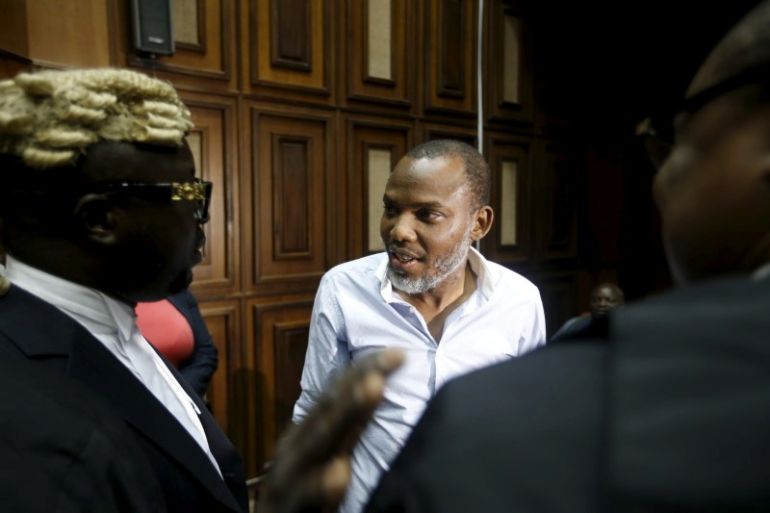Nigeria: Separatist leader to appear in court for treason trial
IPOB leader Nnamdi Kanu has pleaded not guilty to ‘terrorism’ and treason charges.

Nnamdi Kanu, leader of the Indigenous People of Biafra (IPOB), which is agitating for the breakaway of southeastern Nigeria, is due to return to a court in the capital, Abuja, on Wednesday.
Kanu has been charged with “terrorism”, treason and perpetuating falsehoods against President Muhammadu Buhari, mainly through broadcasts on the controversial Radio Biafra outlet and also through social media. He had pleaded not guilty during his last court date on October 21.
After spending two years in detention, Kanu disappeared in April 2017 while on bail. His followers blamed the Nigerian authorities but he mysteriously surfaced in Israel more than a year later.
This June, Kanu, who also holds British citizenship, was arrested in Kenya and repatriated to Nigeria. Since then, IPOB has announced and intermittently enforced regional sit-at-home orders every Monday and sometimes also on other weekdays to register its protest against his continued imprisonment.
Last month, the government of Anambra, one of Nigeria’s five southeastern states, announced the adoption of Saturdays as a school day to substitute for Mondays in order to avoid the harassment of pupils and school authorities by the secessionists.
In 1970, a 30-month-long civil war triggered by Biafra’s secession and in which more than a million people died, came to an end. The region, which is home to the Igbos, the country’s third-largest ethnicity, was reintegrated but agitation for its secession returned after Nigeria’s military-civilian transition in May 1999.
Such sentiments have risen in the past decade, alongside dissatisfaction with the country’s current structure which gives less autonomy to states and more powers to Abuja.
IPOB members say the region has been economically and politically marginalised since the end of the civil war. In recent years, the group increasingly began to amass foot soldiers culminating in the launch of its paramilitary arm, the Eastern Security Network. Announcing its launch last December, Kanu said the new line of defence was necessary “to end years of terrorism in our land”.
Since then, security agencies say IPOB has been responsible for repeated episodes of unrest across the five states. Recently, Justice Minister Abubakar Malami told journalists that 175 security personnel had been killed by the separatists between October 2020 and June 2021. In May, offices of the Independent National Electoral Commission (INEC) in Imo and Enugu states and property within the buildings were burned by unknown arsonists believed to be IPOB members. Meanwhile, residents of the region say they are bookended by violence from both security agencies and secessionists.
IPOB’s sit-at-home orders have also been blamed for crippling businesses and movement in the region, a major commercial hub. Despite rescinding its calls for a boycott of the November 6 governorship elections in Anambra, only about a tenth of the 2.5 million registered voters showed up.
“First, most people comply out of fear, and at an instinctive level, people understand that IPOB has lost control of the thugs they used to enforce the sit-at-home”, said Cheta Nwanze, lead partner of Lagos-based geopolitical risk advisory firm SBM Intelligence.
That loss of control and a government’s continued mishandling of the situation could potentially lead to more unrest depending on the outcome of Kanu’s trial, noted Nwanze.
“Nigeria has lost the monopoly of violence, not only in the southeast but across board and the military will struggle to contain all of the forces that have been unleashed going forward,” he said.